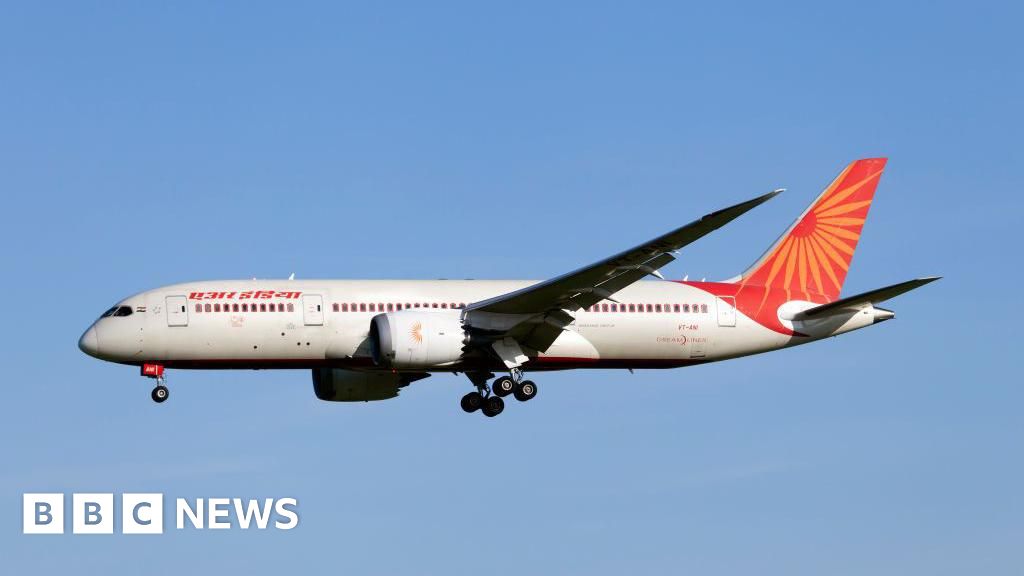One of the engines of the Air India plane that crashed last week was new, while the other was not due for servicing until December, the airline's chairman has said. In an interview with an Indian news channel, N Chandrasekaran said that both engines of the aircraft had "clean" histories. "The right engine was a new engine put in March 2025. The left engine was last serviced in 2023 and due for its next maintenance check in December 2025," he told Times Now channel. At least 270 people, most of them passengers, were killed last Thursday when AI171, a London-bound Boeing 787-8 Dreamliner, crashed less than a minute after taking off from Ahmedabad airport in western India. Investigators are now sifting through debris and decoding recorded flight data and cockpit audio - from the aircraft'sblack boxes which have been found- to deconstruct the flight's final moments anddetermine the cause of the incident. "There are a lot of speculations and a lot of theories. But the fact that I know so far is this particular aircraft, this specific tail, AI171, has a clean history," Mr Chandrasekaran said, cautioning people against jumping to conclusions. "I am told by all the experts that the black box and recorders will definitely tell the story. So, we just have to wait for that," he added. Kishore Chinta, a former investigator with India's Aircraft Accident Investigation Bureau, told the BBC that the condition of an aircraft engine is not necessarily linked to its age - particularly in the case of the Genx-1B engines used on the Boeing 787-8. "The age of the engine has no bearing on the health of the engine, especially for the Genx-1B engines," Mr Chinta said. In other words just because an engine is new, does not necessarily mean it is healthy, or vice versa. Unlike older models, the Genx-1B engines, which are made by GE Aerospace, don't follow a fixed overhaul or maintenance schedule. Instead, they are equipped with a system called the Full Authority Digital Engine Control or FADEC that continuously monitors engine health and performance. The decision to service or replace the engine is based on this data and physical inspections. However, Mr Chinta pointed out that certain components of the engine, known as Life Limited Parts (LLPs), still have a fixed lifespan typically between 15,000 and 20,000 cycles. "Every start and switch-off of the engine counts as one cycle," he explained. While the investigation continues, Air India has also announced a 15% cut in its international operations on wide-body aircraft until mid-July as it grapples with the fallout from the crash. In a statement issued on Wednesday, the airline said the decision was driven by "compounding circumstances" - including enhanced safety checks, increased caution by crew and ground staff and tensions in the Middle East. Separately, the airline said that inspections have been completed on 26 of its 33 Boeing 787-8 and 787-9 aircraft, all of which have been "cleared for service". India's aviation regulator had ordered additional safety checks on Air India's Boeing 787 fleet after the deadly crash as a "preventive measure". The remaining aircraft are expected to be examined in the coming days, Air India said, adding that the airline's Boeing 777 fleet would also "undertake enhanced safety checks". "The curtailments are a painful measure to take, but are necessary following a devastating event which we are still working through and an unusual combination of external events," it said. Meanwhile some experts say the crash will likely have animpact on Air India as it tries to transformfrom a troubled state-owned carrier to a privately-owned company. Tata Sons, a conglomerate which also owns big brands like Tetley Tea and Jaguar Land Rover, brought the airline - formerly India's national carrier - from the Indian government in 2022. Follow BBC News India onInstagram,YouTube,TwitterandFacebook.
Air India says one engine on crashed plane was new
TruthLens AI Suggested Headline:
"Air India Confirms Engine Details Following Boeing 787 Crash Investigation"
TruthLens AI Summary
The recent crash of an Air India Boeing 787-8 Dreamliner, which occurred shortly after takeoff from Ahmedabad airport, has raised significant concerns regarding the aircraft's mechanical integrity and safety protocols. N Chandrasekaran, the chairman of Air India, stated that one of the engines on the ill-fated flight AI171 was new, having been installed in March 2025, while the other engine was last serviced in 2023 and was not due for maintenance until December 2025. Despite both engines having a 'clean' history, the crash resulted in the tragic loss of at least 270 lives, primarily passengers. Investigators are currently analyzing the aircraft's black boxes, which contain critical flight data and cockpit audio, to piece together the final moments of the flight and ascertain the cause of the accident. Chandrasekaran urged caution against premature conclusions, emphasizing that expert analysis of the black boxes would provide clarity on the incident's circumstances.
In light of the tragedy, Air India has announced a 15% reduction in its international operations involving wide-body aircraft until mid-July. This decision is part of a broader response strategy that includes enhanced safety checks and increased vigilance among crew and ground staff, influenced by both the crash's aftermath and ongoing tensions in the Middle East. While inspections have been completed on a majority of Air India's Boeing 787 fleet, with the remaining aircraft undergoing similar evaluations, the airline is grappling with the implications of the crash on its reputation and operational efficiency. Some aviation experts suggest that the incident could hinder Air India's efforts to transition from a state-owned entity to a privately-owned company under Tata Sons, which acquired the airline in 2022. The situation remains fluid as the investigation continues and Air India seeks to navigate the challenges posed by this devastating event.
TruthLens AI Analysis
You need to be a member to generate the AI analysis for this article.
Log In to Generate AnalysisNot a member yet? Register for free.
